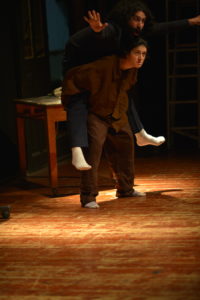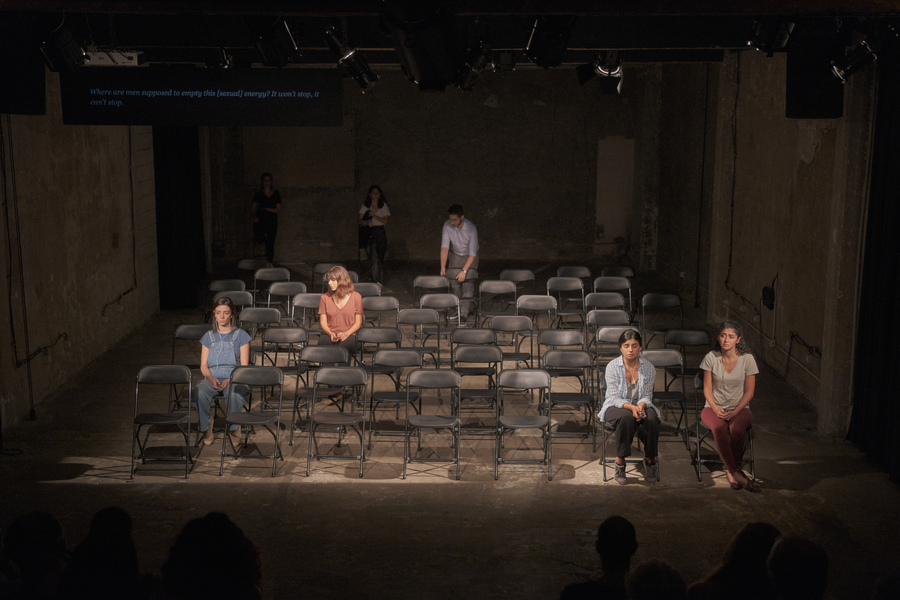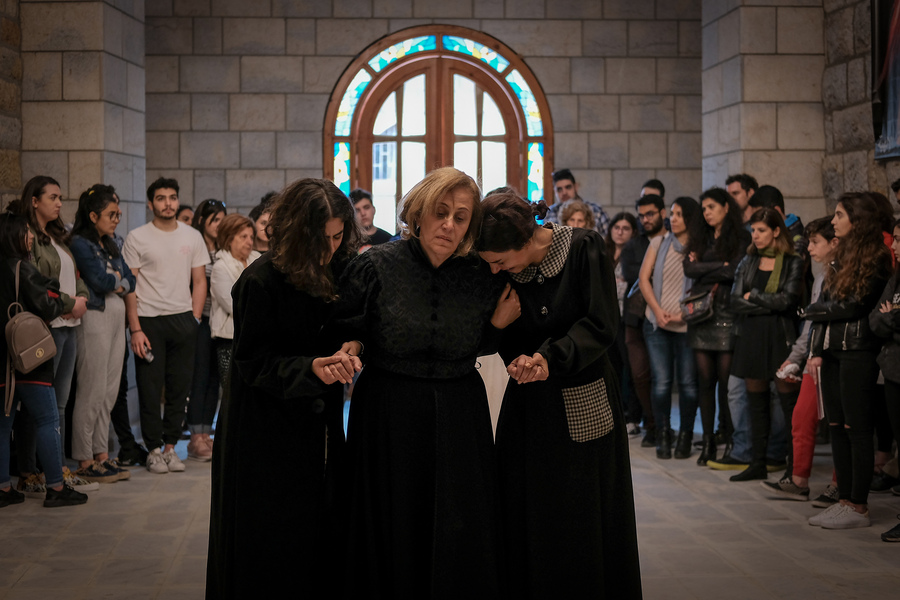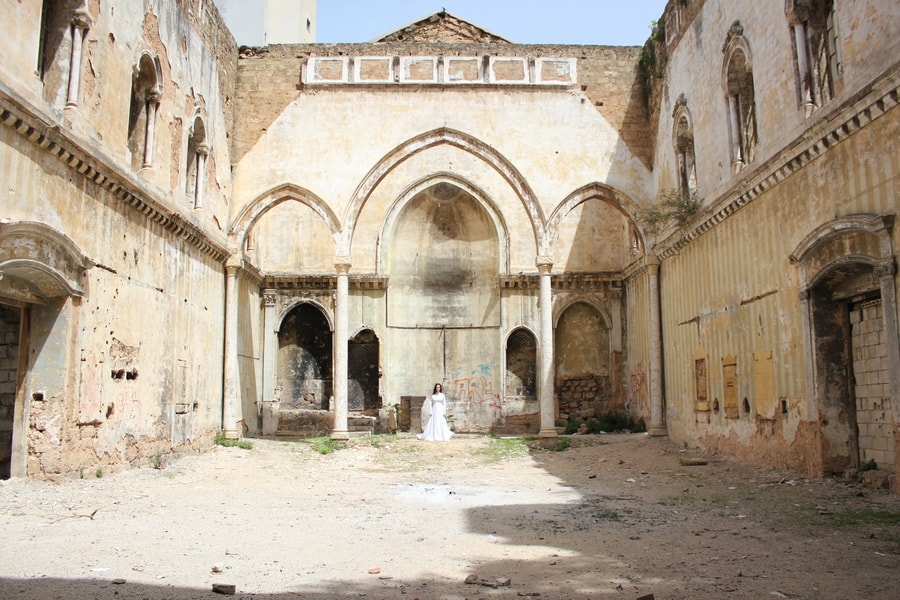“For a while, I was lost,” said new Golden Thread Productions executive artistic director Sahar Assaf (she/her). “I didn’t know what to do.”
She was referring to a point in her life where she chose to study journalism rather than move from her small village in Mount Lebanon to Beirut to study theatre, because her family wasn’t supportive of her artistic choice. Assaf grew up in a closed-off community during the Lebanese Civil War—a time, she said, where people stuck to their communities. She ended up spending a lot of her time reading and exploring the depths of her imagination.
“There were a lot of borders in my life,” Assaf said, “and that got me to practice using my imagination and creating scenarios.”

Though Assaf didn’t wind up as a journalist—nor a sociologist, as her Masters degree in that discipline might suggest—she did eventually find her way to the theatre. First she began doing theatre work in her spare time, adding afternoon and evening theatre work to leave room for a full-time job. As theatre didn’t pay enough to make a living, she decided to make a plan, one she had seen many do before her: Get a graduate degree in theatre and then teach, which would in turn fund her ability to do the kind of theatre work she wanted to do.
After applying for, and receiving, a Fulbright scholarship in 2009, Assaf received her M.A. in theatre studies from Central Washington University before returning to Lebanon to teach. Assaf went on to lead the theatre arts minor program at the American University of Beirut (AUB), where she was also an assistant professor and the co-founder, with playwright and long-term collaborator Robert Myers, of the Theater Initiative. This program brought together an interdisciplinary group of faculty and artists to facilitate theatre creation and research locally, regionally, and internationally.
Assaf’s theatre work as an actor, director, translator, and producer has taken her all over the world, including presenting works in Syria, Egypt, Morocco, Belgium, London, Sweden, Poland, Greece, New York City, and Chicago. It’s worth noting that that list does not include Golden Thread’s home city of San Francisco. Indeed, though she had worked with the Middle East-focused companies Noor Theatre (New York City) and Silk Road Rising (Chicago) as part of her annual travel to the U.S. as a visiting artist while at AUB, she hadn’t yet had an opportunity to work with the West Coast company.
Last week I had a chance to speak with Assaf about the mission that drives her work and the vision she has for the future of Golden Thread as she takes over for the company’s founding artistic director Torange Yeghiazarian.

JERALD RAYMOND PIERCE: What got you into theatre in the first place?
SAHAR ASSAF: I like to believe that what got me into theatre is the fact that it gave me space. When I was growing up, it gave me space to survive. Basically, it gave me a space to stay hopeful and to dream and to imagine alternative worlds, because the world I was living in wasn’t enough for me. I think through acting, you live all the lives of the different characters.
And then, when you’re directing—that’s how I started in theatre. I knew nothing about it. I was reading in books and coming to the rehearsal and trying things out, and just pretending that I knew what I’m doing with the actors, because I wanted to create a space for myself. And because I didn’t go to school for it and I didn’t know people in theatre, it was hard for me to get roles, to get me opportunities, so I created my own opportunities by directing. Then, when people started knowing me, I started being cast too.
Speaking of creating opportunities, how do you see your role with Golden Thread?
I think it’s exactly that. As an artistic director, in a way you’re a gatekeeper. My job here—this is at least how I’m looking at it and what I’m hoping to do—is, I want to discover new voices. I want to create more spaces for emerging voices to shine. I say this because, though I tried to create my own opportunities, there were people in my life who were opening doors for me. That’s exactly the kind of thing I’d like to do, to keep opening the door.
I’m personally very interested in collaboration with all sorts of artists, regardless of the experience they have or their background. Having worked with students for a long time, I feel like people who are fresh in the field sometimes are the most interesting, because they have no fears, they’re not intimidated, they haven’t experienced much rejection to start creating these judges in their minds. They throw themselves in and they try things and they dream. So I’m interested in new voices. I’m interested in keeping the door open. I’m hoping we can expand the artistic scope of Golden Thread.
When we’re talking about the ability to open doors, is that specifically what interested you in this opportunity, or was there something else about Golden Thread that drew you to this position?
I’d never really crossed paths with Golden Thread. So when I read the opportunity, I spent so much time on the website learning about the various programs, the mission. And the first thing that really stood out for me was the mission statement. I felt like our theatrical and life values aligned in a big way. I love, for instance, the responsibility they have for sharing stories, the fact that there’s a cultural consultant on projects if, say, the artists doing the projects are not from the said country or the said culture.
I love the fact that they’re really fighting against—in the popular culture here, the idea about the Middle East, for instance, is really wrong, is really out of place. I love that this is a fight that Golden Thread has been taking on since 1996. We speak about it today more freely, I guess, but I think when they started and throughout the years, it was really a big thing to dismantle. The Middle East is not one thing. It’s a multitude of stories and backgrounds.
Having been in the Middle East when I was applying for this, and having lived in the Middle East all my life, I felt like this was a fight I’d like to join—obviously in a peaceful way. This is a cause that I believe in. And whatever’s happening here with American foreign policy greatly affects life in the Middle East. It’s important for people here to know the Middle East.
Obviously, it’s not something that we can define in a simple way in a statement. Cultures are very dynamic and they’re in constant change. The fact that they have attention to that and they’re engaging different Eastern communities, I love that. That spoke to my heart.

Your career has taken you all over the world. Do you see theatre playing a different role in the United States than it does elsewhere in the world?
Well, I have to be honest, I just got here. So although I’ve been working in the U.S. as a visiting artist from time to time, I haven’t really experienced the local theatre scene. But I can tell you the kind of theatre that I’m interested in, what I believe theatre can do, it doesn’t matter where. I think theatre has certain powers. It’s transformative, or it must be. I don’t think all theatres are transformative, but the kind of theatre I’m interested in is theatre that has the power or the ability to transform us.
I can tell you an example. I was doing a project in Beirut in 2013, by a Syrian playwright, Sa’dallah Wannous, called Rituals of Signs and Transformations. It’s a very political play. It really challenges the religious institutions and corrupt practices, all of this. The women in the play are really the catalyst for change, so I decided I would end the play with the Adhan, which is the Muslim religious chanting, which is usually sung by men. I wanted to end the play with the Adhan being sung by a woman, by the main character in the play.
I remember, after the show, one guy was talking to me—apparently, he belonged at some point in his life to a religious group in Lebanon, then he left—and he said, “That song, I know why you did it. I know what it means, and that’s what drove me out of the religious extremist group.” I think that moment of realization is what I would aim to do. I want people to be touched. I want people to be moved, to reflect on their own values, their own life choices.
I’m interested in multilingual theatre. I’m interested in documentary theatre, theatre that is based on personal testimonies, because I really feel, no matter how beautiful the writing is, nothing would match the beauty of the real narrative coming out of the mouth of an individual who is the subject matter.
I would be doing here theatre that, first, is reflective of whatever’s happening in the local environment. I believe, the more we go local, the more it becomes universal, and it would speak to audiences everywhere. It has to be specific. In theatre, we have to be precise, not only in how we’re acting, but also in what is it that we’re trying to say.
It sounds like a lot of deep care goes into your work, which I feel is important in theatre. Keeping all this in mind, what should audiences expect from seasons and productions shaped by your vision?
Oh, that’s a hard one. The fact is, it’s really a challenging moment, because I did this move during the pandemic. I haven’t really experienced putting on work for a live audience in a physical space yet. My first project for Golden Thread was a staged reading based on testimonies of survivors of the Beirut explosion last year. I think this can be example. I’m going to be responding to events or to happenings in our environment that, first of all affect me as a person, as a human being, as a woman, but also events that I think we must tackle as a community to better our community.
There are things that we can’t take for granted that are happening. What’s our responsibility as citizens of the world today? We’re living in a very open kind of small globe. I think we, as artists, tend to believe that we have a responsibility. And I felt like my responsibility to Beirut was to keep talking about the explosion, because it’s not okay that the biggest non-nuclear explosion happens and people are not accountable yet. It’s not only a Lebanese problem, it’s a world problem. This is a human crisis: 200 people were killed, 7,000 injured, 300,000 overnight became displaced without their roof.
I did feel helpless, to be honest. I was there when the explosion happened. I was scared. I was traumatized by it. This year, I’m here because I took on this job, but I still feel like I have the responsibility toward my home country and experience I lived with so many others. So what I did was this reading based on testimony. An actress from San Francisco and an actress from Beirut—it was bilingual, accessible to audiences who speak in either language.
I would love for our audiences to expect this from me. I want to be concerned as a citizen here, but also a citizen of the world. And because our company is focused on the Middle East, I think building bridges with the Middle East is top priority for me. We want to speak to the Middle Eastern communities in the U.S., but we want to also keep building the connections with Middle Eastern communities living in the Middle East today.
At the same time, I want to say that I would love to create spaces for joy, because the Middle East is a beautiful place, a joyful place. Unfortunately, when we’re speaking about the Middle East today, I notice that it’s always one thing: It’s war. It’s one religious group and this or that. Honestly, even during war, people continue to live, people continue to get married and have weddings. We rarely see stories of everyday life being staged. I want to try and create more spaces for everyday life stories that would speak to audiences regardless of where they come from—stories that would reflect the shared human experience.

I love that, hearing about work that acutely looks at society and tries to have a conversation.
I’m glad it resonates. That’s what brought me to theatre. At first, I used to believe it’s an escape—I’m escaping from an environment, from a reality that’s not really fulfilling. But now I think of theatre as a fight forward. It’s not an escape, it’s an active fight. When you go do theatre, like we did in Lebanon during war, during armed conflict—I remember at one point we were doing The Blind by Maurice Maeterlinck. It’s a classical piece. It can be political, symbolic, all of this, but it’s not really a play about the current moment or whatnot. But just the fact that we are commuting, whether we knew we were going to be able to perform or not—that’s an act of resistance. I’d like to think of theatre today as a place to resist the status quo. At least for artists, this is our weapon to try and change things that are not working.
Is there anything else that you’d like readers to know that we haven’t touched on yet?
When we spoke about documentary theatre—I think that’s important. I’d love to explore doing more documentary stuff at Golden Thread. I’m interested in collaboration, and I would like to put a call out there to American artists of Middle Eastern descent to knock on our door and nudge me. I would like to meet more people because, again, I’m new here. I’m doing my best to reach out and all of this, but I’m always open to people coming across and saying, “Hey, let’s collaborate on that.” I’m always open for that. Even international collaborations. One thing I did recently was the Directors Lab Mediterranean, which is a sister chapter to Lincoln Center’s Directors Lab, created by Anne Cattaneo. The Directors Lab Mediterranean is a collaboration across various cities. On the steering committee, we have people from Italy, Spain, Athens, Lebanon, Jordan. What we’re trying to do is rotate the Director’s Lab. Every year, it would take place in a Mediterranean city. We launched in Beirut, then we did one edition online, and then, this year, it happened in Barcelona.
The idea of collaborations really excites me, because that’s how I think I grow: meeting people of different cultures, trying to understand their language, the way they do work, what concerns them. All of this makes me, I think, a better human. So I want to say: I’m here, and people please reach out if I haven’t reached out. Let’s try and do work.
Jerald Raymond Pierce (he/him) is associate editor of American Theatre. jpierce@tcg.org


